- Biblioteca CEPAL
- Biblioguias
- biblioguias_en
- 75 years of ECLAC and ECLAC thinking
- The 1970s: development models in Latin America and the Caribbean
75 years of ECLAC and ECLAC thinking
The 1970s: development models in Latin America and the Caribbean
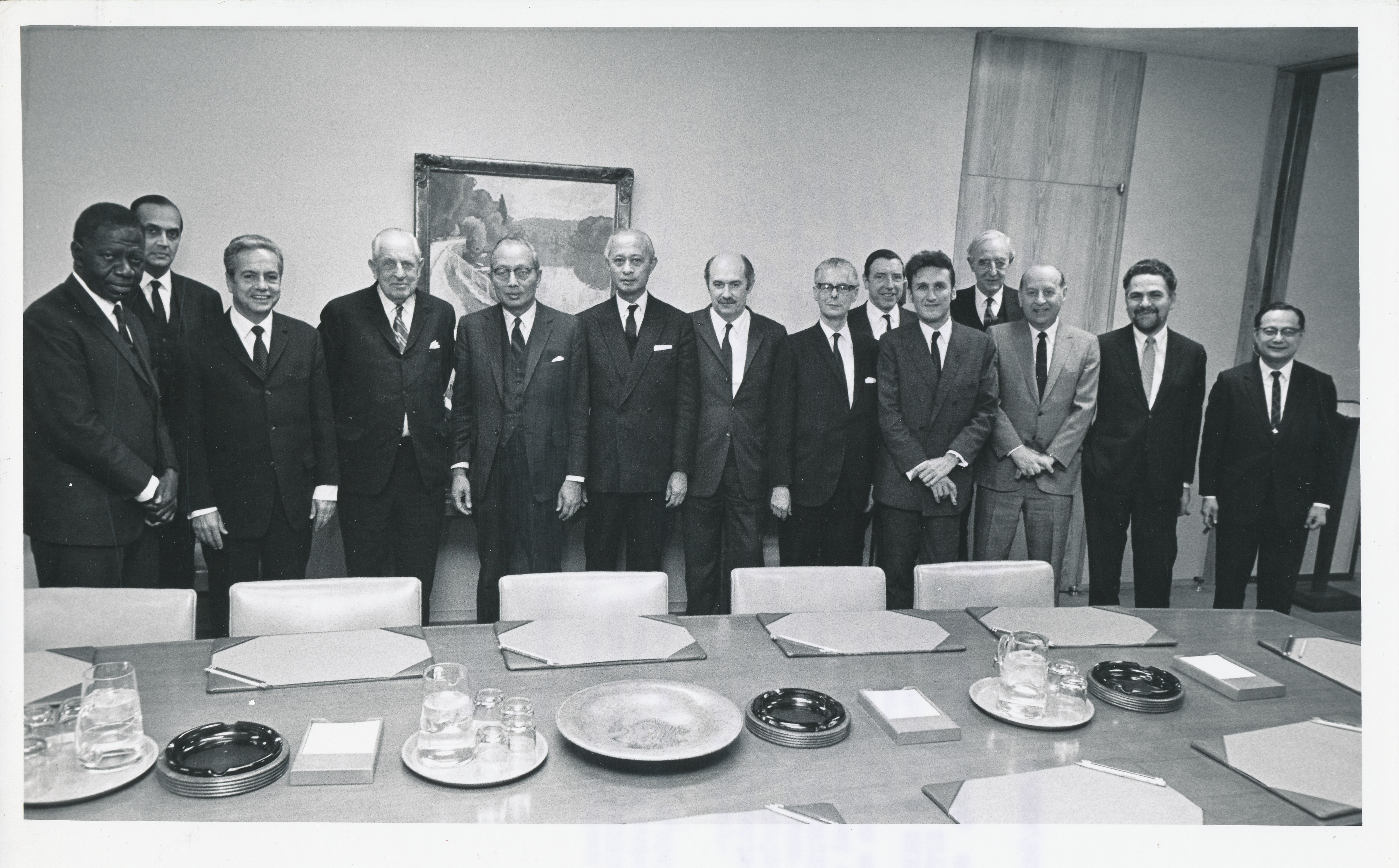
Meeting of the Executive Secretaries of the United Nations Regional Economic Commissions and the Director of UNESOB at United Nations Headquarters
The executive secretaries of the four UN regional economic commissions and the Director of the United Nations Economic and Social Office at Beirut (UNESOB), Economic Commission for Western Asia (ECWA) met at the UN headquarters on 21 to January 23, 1970. The meeting was held under the chairmanship of the Assistant Secretary General for Economic and Social Affairs. The participants are seen here while meeting with UN Secretary-General U Thant. From left to right: Robert K. A. Gardiner, Executive Secretary of the Economic Commission for Africa (ECA); C. A. Narasimhan, UNDP Deputy Administrator; Carlos Quintana, ECLAC Executive Secretary; Paul G. Hoffman, UNDP Administrator; U Thant, UN Secretary-General, U Nyun, ECAFE Executive Secretary, Janez Stanovnik, Executive Secretary of the Economic Commission for Europe (ECE), Manuel Pérez-Guerrero, UNCTAD Secretary General, Andrew A. Stark, Deputy Secretary Administration and Management; Jean-Pierre Martin, Director of UNESOB, Martin Hill, Under-Secretary-General for Inter-Agency Affairs; Phillippe de Seynes, Under-Secretary for Economic and Social Affairs, Richard Paw-U, Head, Section of Regional Commissions.
United Nations, New York, January 23, 1970
Credit: ECLAC, United Nations
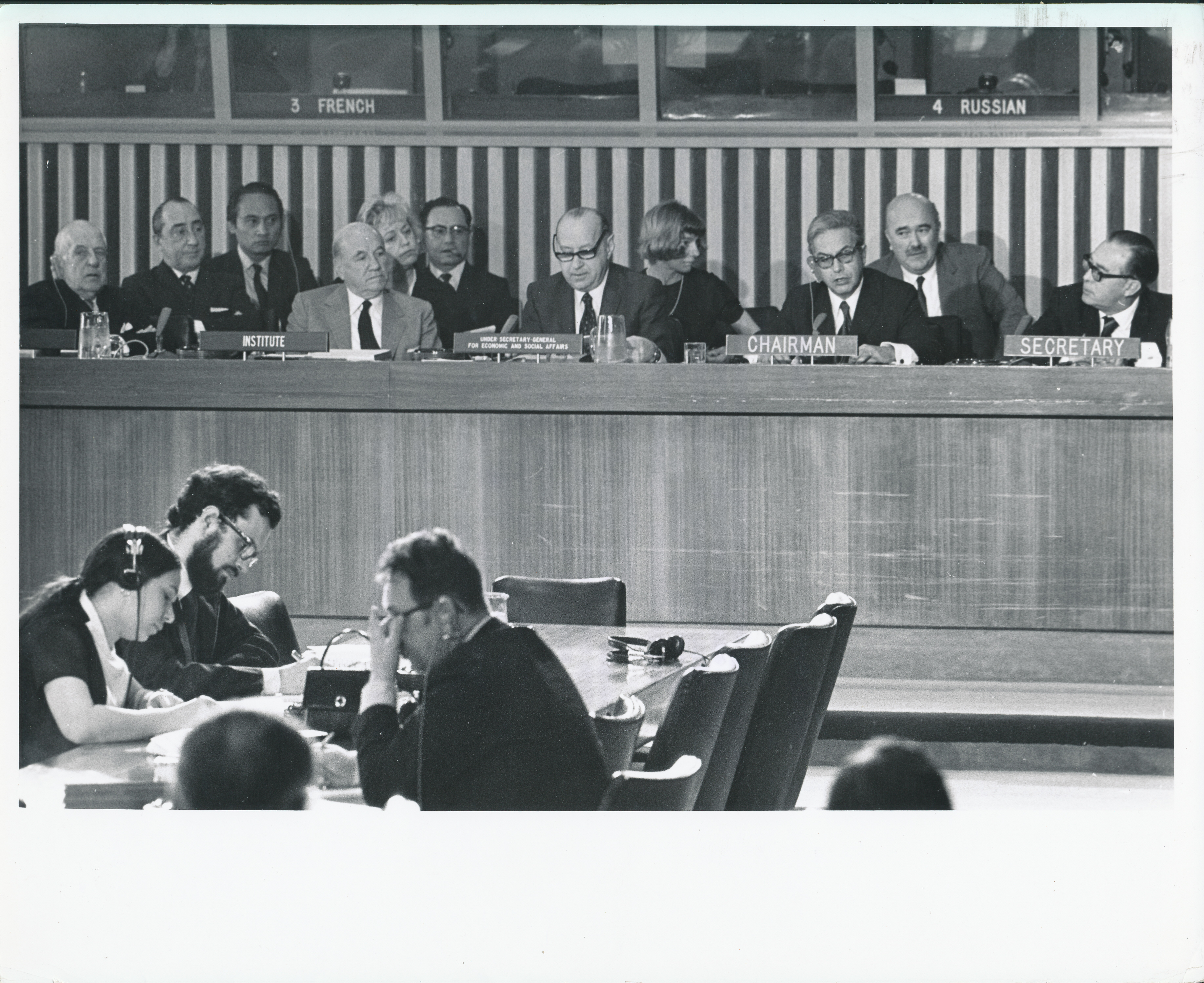
Carlos Quintana, ECLAC Executive Secretary and Raúl Prebisch at the Fifth Extraordinary Meeting of the ECLAC Committee of the Whole
The Committee of the Whole examines the economic and social situation in Latin America, prepares an action plan for the activities of the Commission during the Second United Nations Development Decade, and considers the financing of the Latin American Institute for Economic and Social Planning (ILPES). The session, which ended on May 6, was held in New York with 29 members of ECLAC who maintained permanent missions at the United Nations headquarters. Second from the right: Carlos Quintana, Executive Secretary of ECLAC making a statement. From left to right, at the chair table: Paul G. Hoffman, Administrator of the United Nations Development Program (UNDP); Raul Prebisch, Director General of ILPES; Philippe de Seynes, Under-Secretary-General for Economic and Social Affairs; Carlos Quintana, ECLAC Executive Secretary and Julio Valdés, Secretary.
United Nations, New York, May 4, 1970
Credit: ECLAC, United Nations
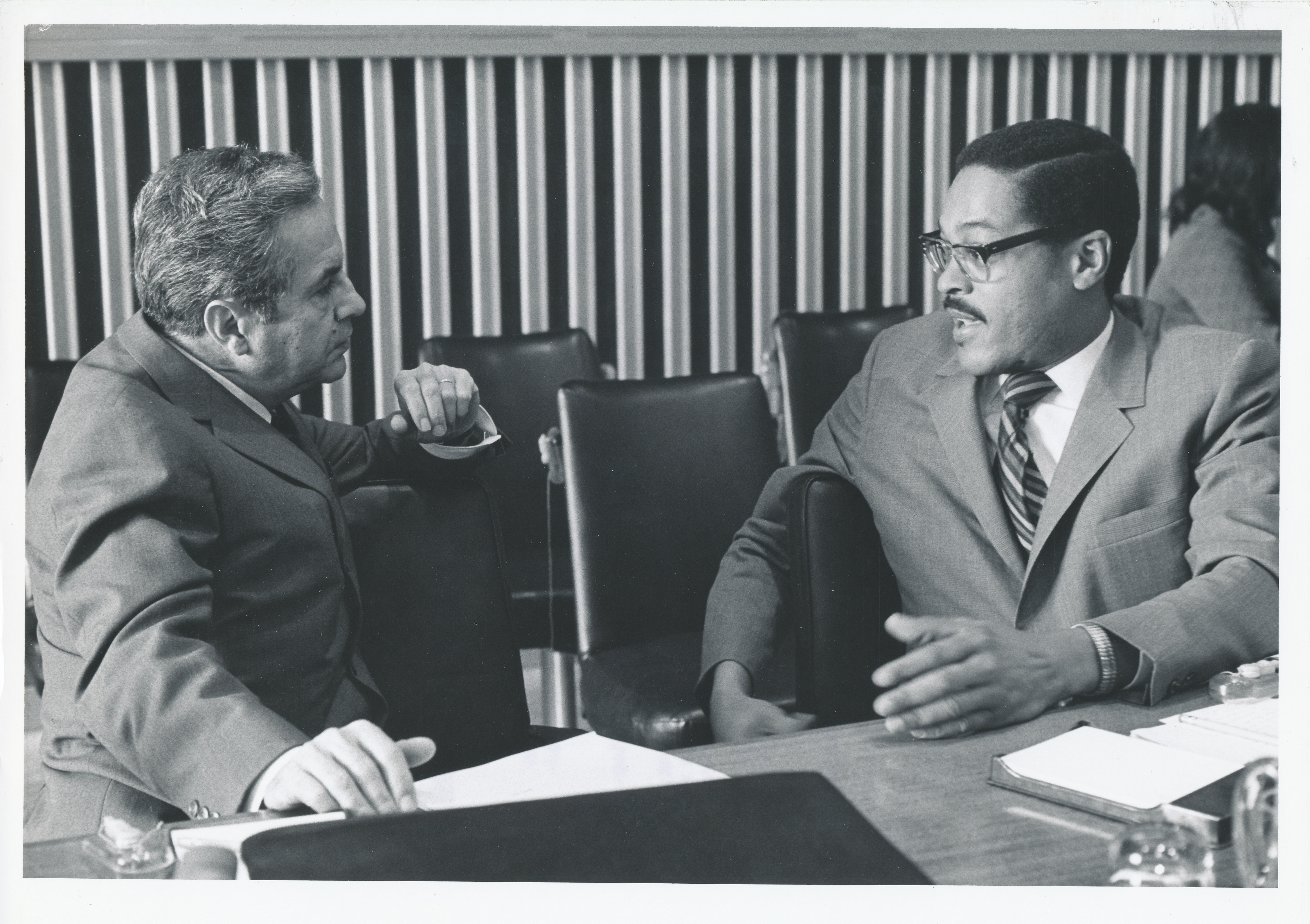
The ECLAC Committee of the Whole holds its Fifth Special Meeting at UN Headquarters
Carlos Quintana, Executive Secretary of ECLAC (left) talking with Maurice O. St. John, Vice Chairman of the Committee, Trinidad and Tobago in the framework of the Committee of the Whole at its Fifth Special Meeting at UN Headquarters. United Nations, New York, May 5, 1970. The ECLAC Committee of the Whole held its Fifth Special Meeting at UN Headquarters (May 4-6, 1970). It examined the economic and social situation in Latin America, prepared an action plan for the Commission's activities during the Second United Nations Development Decade, and considered financing for the Latin American Institute for Economic and Social Planning (ILPES). The session, which was held in New York since the 29 members of ECLAC maintain Permanent Missions at the UN Headquarters.
United Nations, New York, May 5, 1970
Credit: ECLAC, United Nations
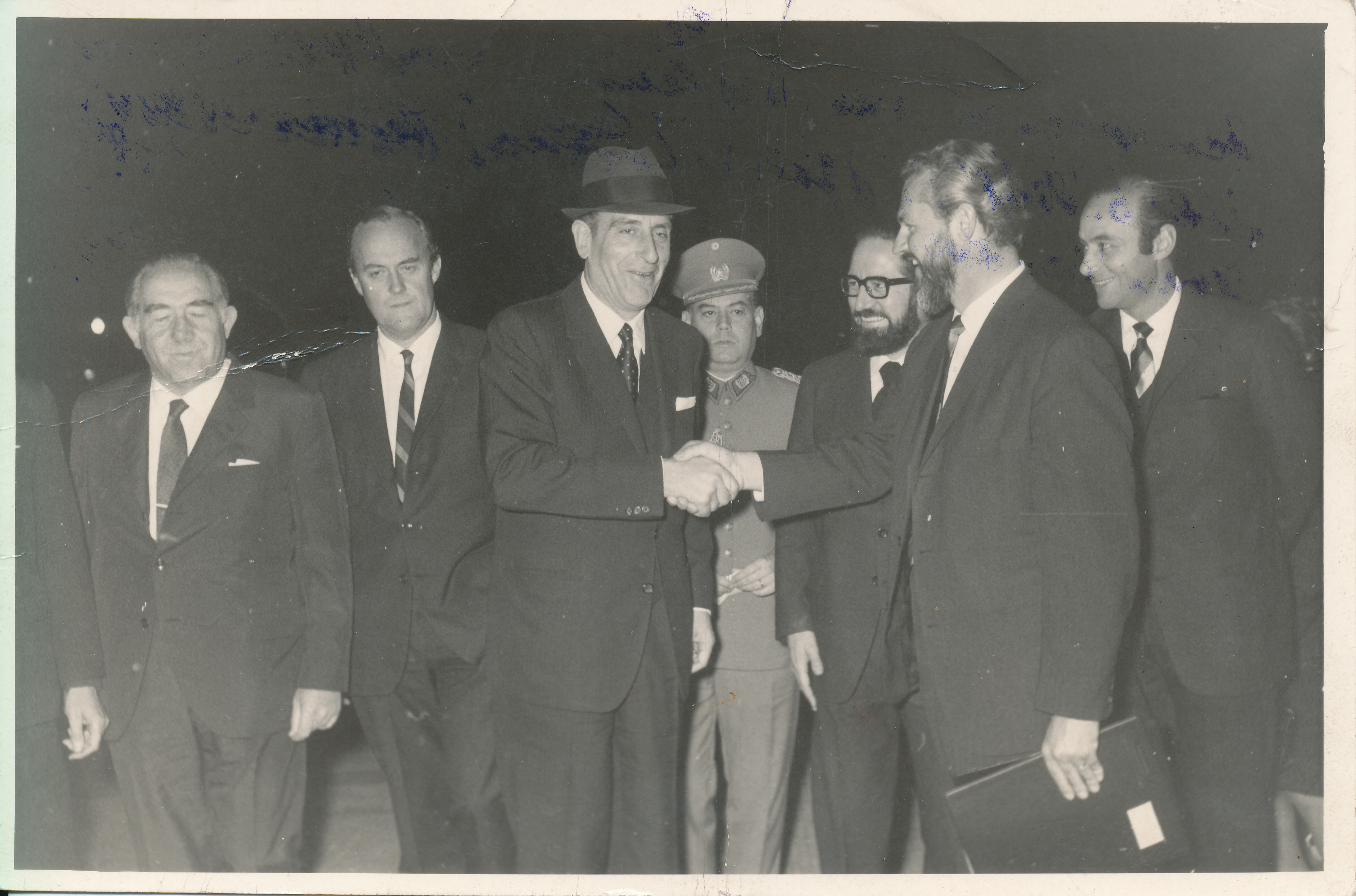
Osvaldo Sunkel with the President of Chile, Eduardo Frei Montalva
Osvaldo Sunkel shaking hands with Eduardo Frei Montalva, former President of Chile, at the Pacific Conference of the Institute of International Studies of the University of Chile, Viña del Mar, to discuss issues related to the Pacific Alliance. From left to right: Eduardo Boeninger (second), Eduardo Frei, Claudio Véliz, Founder of the Institute of International Studies, Osvaldo Sunkel, and Ricardo Jordán from the Pontificia Universidad Católica de Chile.
Vina del Mar, Chile, September 27, 1970
Credit: ECLAC, United Nations

ECLA Session Hears Address by Secretary-General of United Nations Conference on Human Environment
The United Nations Economic Commission for Latin America (ECLA) at its meeting in Santiago on 3 May, heard a statement by the Secretary-General of the United Nations Conference on the Human Environment, Maurice Strong.
Mr. Maurice Strong (left), Secretary-General of the United Nations Conference on the Human Environment, and Mr. Carlos Quintana, Executive Secretary of ECLA.
ECLAC, Santiago, May 3, 1971
Credit: UN Photo
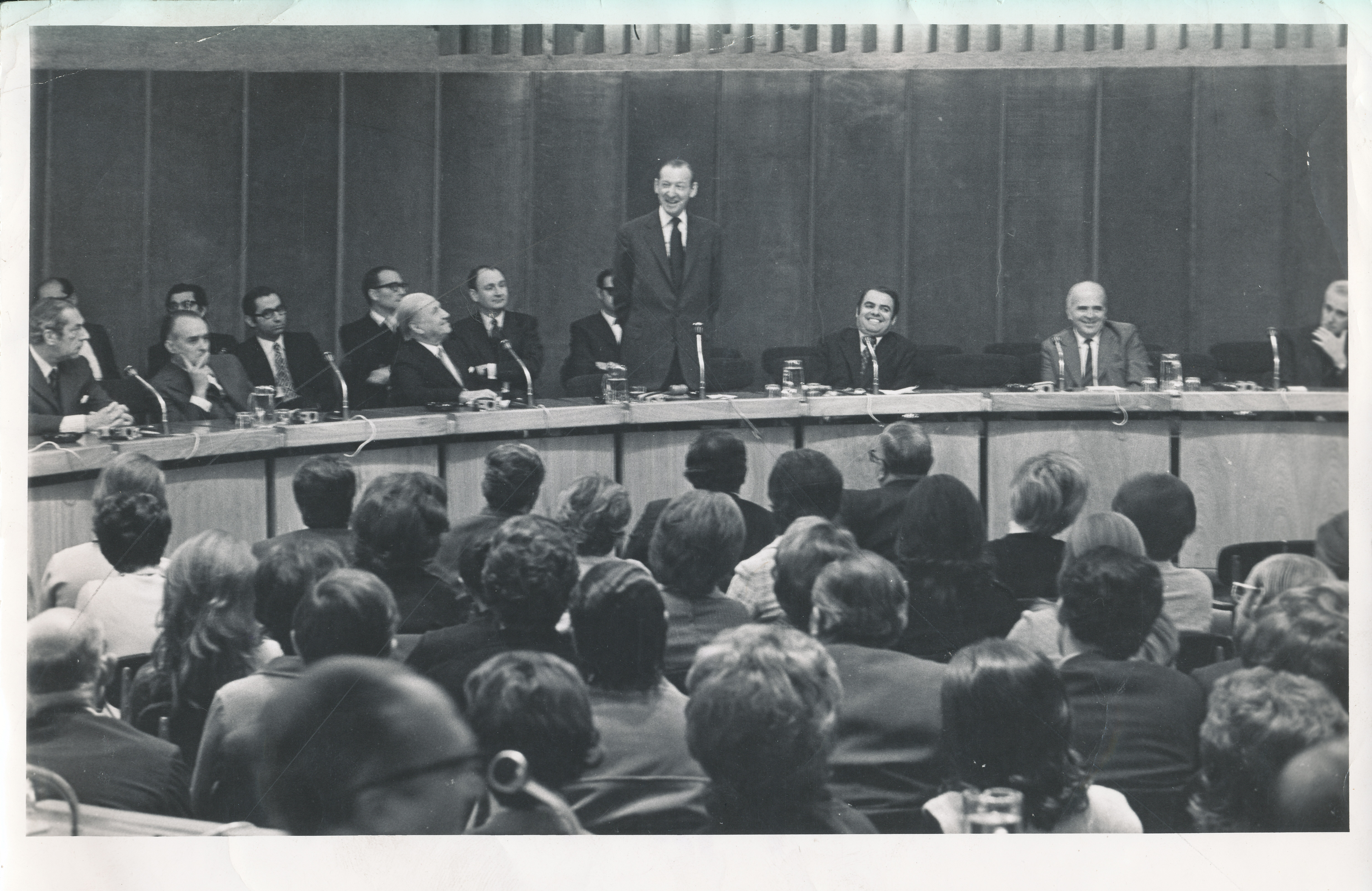
United Nations Secretary General Kurt Waldheim visits Chile
United Nations Secretary General Kurt Waldheim visits Chile in the framework of the third session of the United Nations Conference on Trade and Development (UNCTAD). At the table from left to right: Gabriel Valdés, Director of the Regional Office for Latin America; Manuel Balboa, ECLAC Assistant Secretary General; Raúl Prebisch, ILPES Director General, Kurt Waldheim and Enrique Iglesias, Executive Secretary of the ECLAC; Cristobal Lara, Deputy Director General of ILPES.
ECLAC, Santiago, April 13-16, 1972
Credit: ECLAC, United Nations

Press Conference by Secretary-General of UN Conference on Human Environment
Mr. Maurice F. Strong, Secretary-General of the U.N. Conference on Human Environment, at his press conference held in Santiago. At left is Mr. Carlos Plaza, ECLA official from the Natural Resources and Energy Division. At the right is Mr. David Millwood, Chief of UNCTAD Information Services. Mr. Strong was in Santiago attending the third session of UNCTAD which opened on 13 April.
Santiago, April 19, 1972
Credit: UN Photo
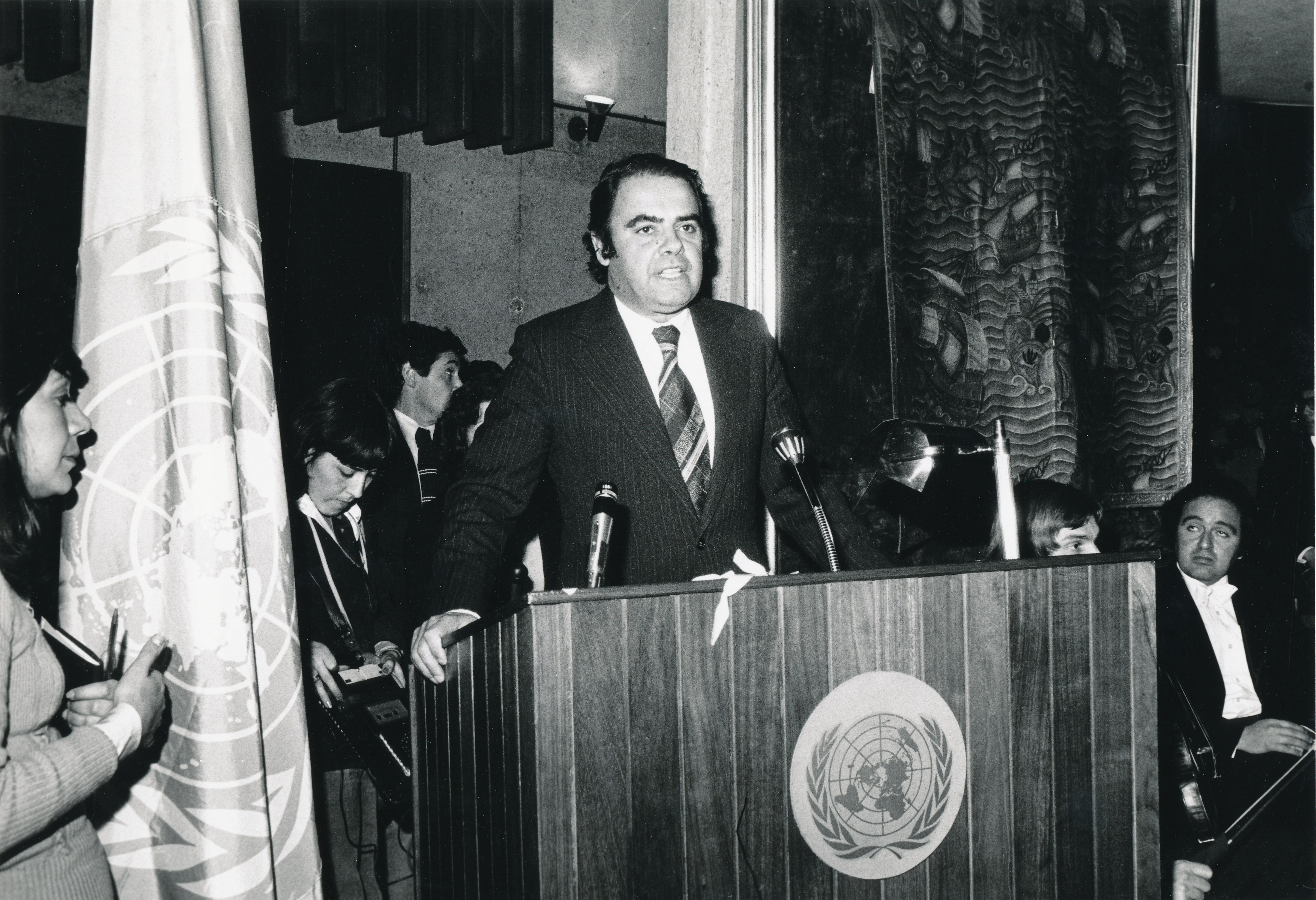
Commemoration of the 30th Anniversary of ECLAC
Enrique V. Iglesias, Executive Secretary of ECLAC, at the commemorative meeting on June 7. ECLAC celebrated its thirtieth anniversary at a ceremony held at the ECLAC headquarters in Santiago, Chile. The orchestra of the University of Chile played at the commemorative concert under the direction of Víctor Tevah.
ECLAC, Santiago, June 7, 1978
Credit: ECLAC, United Nations
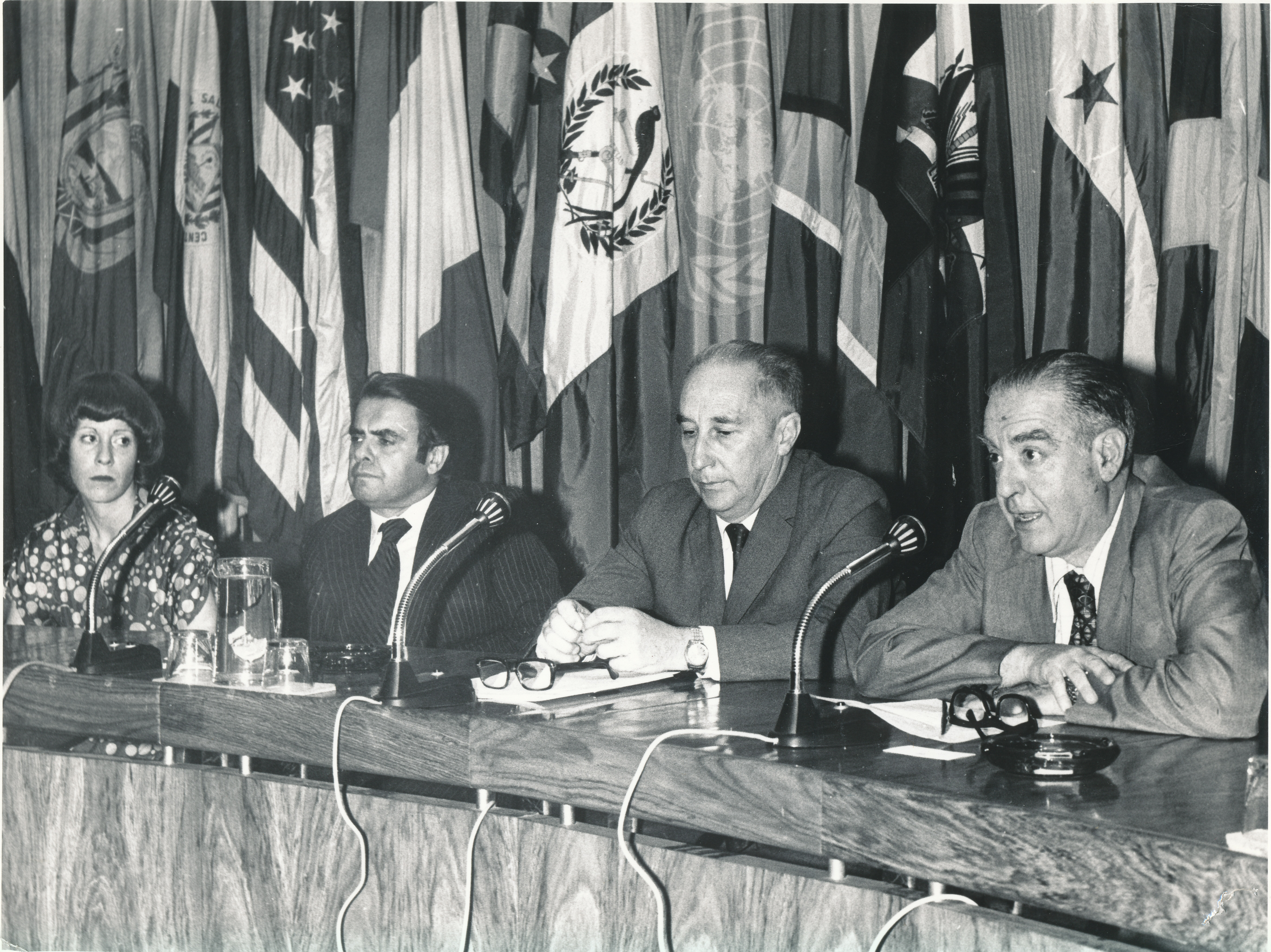
Tribute to Mr. José Medina Echavarría on the first anniversary of his death
Enrique V. Iglesias, Executive Secretary of ECLAC (second from right to left) during a ceremony to honor f Mr. José Medina Echavarría one year after his death.
ECLAC, Santiago, November 13, 1978
Credit: ECLAC, United Nations
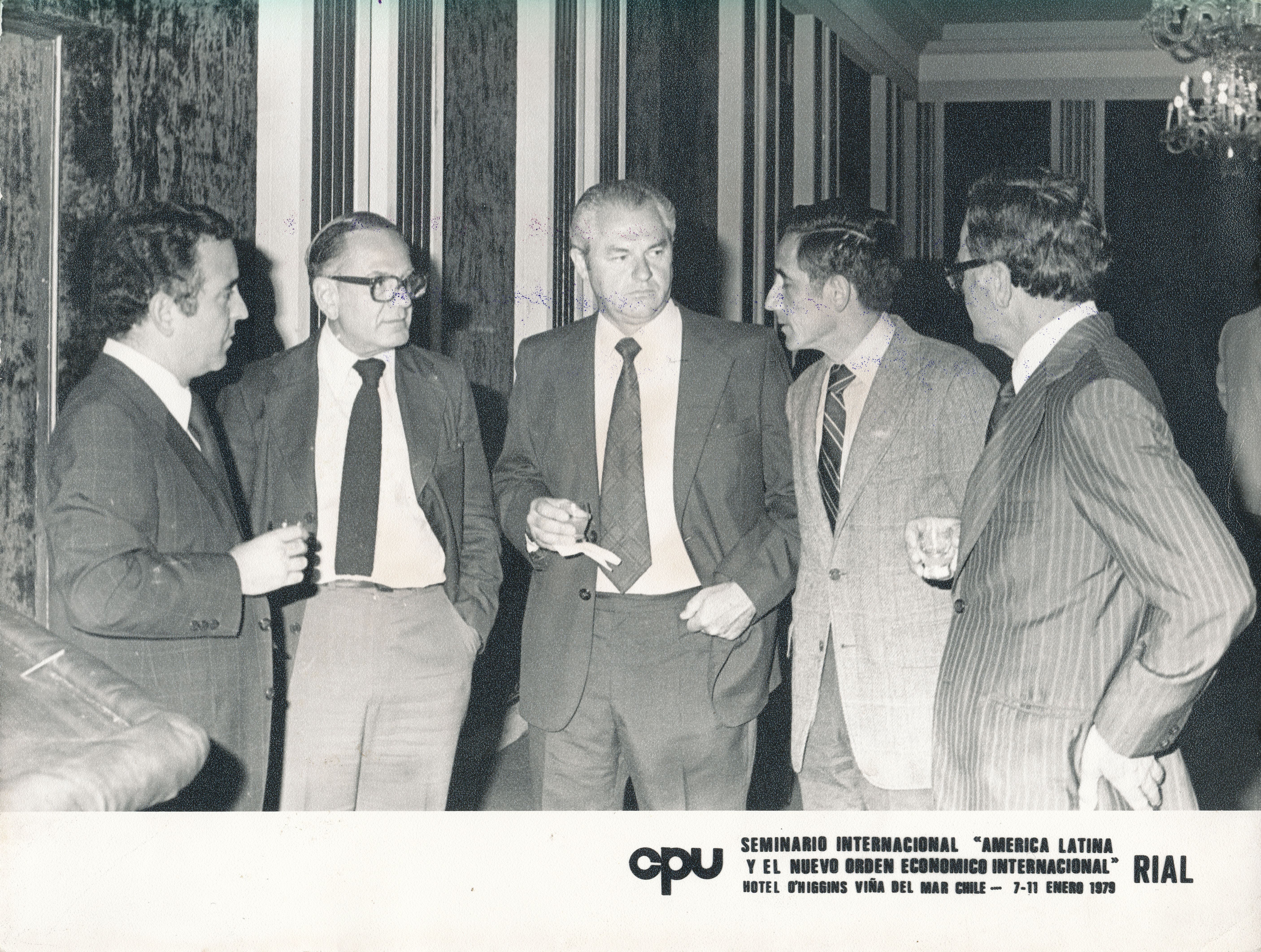
Osvaldo Sunkel together with other participants in the International Seminar (1979)
Conversing from left to right: Eugenio Ortega, Human Development, UNDP; Helio Jaguaribe, Brazilian political scientist and Osvaldo Sunke at the international seminar "Latin America and the New International Economic Order".
Hotel O'Higgins, Viña del Mar, Chile. January 7-11, 1979.
Credit: ECLAC, United Nations

In the 1970s, ECLAC thinking continued to advance along two main lines: the nature and difficulties of economic growth and industrial development, and income distribution.
In response to a series of liberalization proposals introduced in the Southern Cone countries in the 1970s, ECLAC adopted a cautious approach to possible changes to the regulatory framework governing economic activity. However, since the early 1960s, many of the Commission’s scholars had recognized the importance of assessing the degree of protectionism that existed. Instead, the proposal was to encourage exports geared towards the regional and global markets.
Central to ECLAC thinking during this decade was establishing development patterns with environmentally and socially sustainable means of production, consumption and distribution, and promoting regional exports of manufactures.
Selected texts 1970-1979
“In the 1970s, ECLAC's thinking would continue advancing around its two fundamental lines: the nature and difficulties of economic growth and industrial development and income distribution...However, in the face of a wave of liberalization introduced in In the countries of the Southern Cone in the 1970s, ECLAC adopted a reserved attitude towards possible revisions of the regulatory framework for economic activity, despite the fact that since the early 1960s many of its intellectuals had recognized that it was excessively protectionist. Instead, it was proposed to encourage exports oriented to the regional and global arenas.” [Free translation] (Reflexiones sobre el desarrollo en América Latina y el Caribe: conferencias magistrales 2015. CEPAL, 2016, p. 57)
-
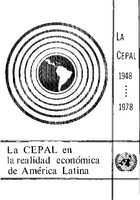 La CEPAL 1948-1978
Publication Date: 1978Serie de 5 títulos:
La CEPAL 1948-1978
Publication Date: 1978Serie de 5 títulos:
- La obra de la CEPAL según la comunidad internacional;
- El aporte de las "ideas-fuerza";
- La CEPAL-gobiernos;
- La CEPAL en la realidad económica de América Latina;
- La CEPAL en breve
Featured Documents
-
 Change and development: Latin America's great task: report submitted to the Inter-American Development Bank
Publication Date: 17 April 1970
Change and development: Latin America's great task: report submitted to the Inter-American Development Bank
Publication Date: 17 April 1970 -
El subdesarrollo latinoamericano y la teoría del desarrollo by
Publication Date: 1970México, DF: Siglo Veintiuno -
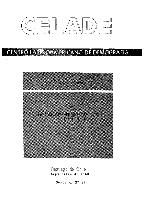 La población de América Latina en el siglo XX
by
Call Number: E/CN.CELADE/A.48.Publication Date: febrero de 1971
La población de América Latina en el siglo XX
by
Call Number: E/CN.CELADE/A.48.Publication Date: febrero de 1971 -
 Economic development, planning and international co-operation
by
Call Number: E/CN .12/582/Rev.1Publication Date: June 1973(Serie Conmemorativa del XXV Aniversario de la CEPAL)
Economic development, planning and international co-operation
by
Call Number: E/CN .12/582/Rev.1Publication Date: June 1973(Serie Conmemorativa del XXV Aniversario de la CEPAL) -
 Interpretación del proceso de desarrollo latinoamericano en 1949
by
Publication Date: febrero de 1973(Serie Conmemorativa del XXV Aniversario de la CEPAL)
Interpretación del proceso de desarrollo latinoamericano en 1949
by
Publication Date: febrero de 1973(Serie Conmemorativa del XXV Aniversario de la CEPAL) -
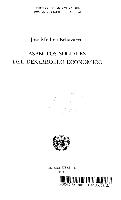 Aspectos sociales del desarrollo económico
by
Publication Date: 1973(Serie Conmemorativa del XXV Aniversario de la CEPAL)
Aspectos sociales del desarrollo económico
by
Publication Date: 1973(Serie Conmemorativa del XXV Aniversario de la CEPAL) -
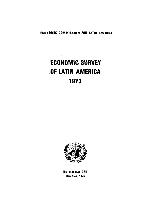 Centre and periphery: new bases for negotiation
by
Call Number: E/CN.12/974/Rev.1Publication Date: 1973In: Economic survey of Latin America, 1973 - E/CN.12/974/Rev.1 - 1973 - p. 1-12
Centre and periphery: new bases for negotiation
by
Call Number: E/CN.12/974/Rev.1Publication Date: 1973In: Economic survey of Latin America, 1973 - E/CN.12/974/Rev.1 - 1973 - p. 1-12 -
Mujeres en América Latina: aportes para una discusión by
Publication Date: 1975Mexico: Fondo de Cultura Económica -
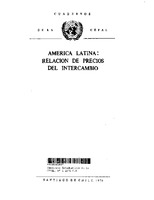 América Latina: relación de precios del intercambio
Publication Date: 1976Serie:Cuadernos Estadísticos de la CEPAL, No.1
América Latina: relación de precios del intercambio
Publication Date: 1976Serie:Cuadernos Estadísticos de la CEPAL, No.1 -
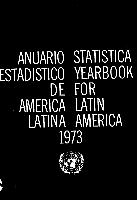 Anuario estadístico de América Latina, 1973 = Statistical yearbook for Latin America, 1973
Call Number: E/CEPAL/977Publication Date: 1976
Anuario estadístico de América Latina, 1973 = Statistical yearbook for Latin America, 1973
Call Number: E/CEPAL/977Publication Date: 1976
-
 Boletin FAL No. 1
Publication Date: agosto de 1975
Boletin FAL No. 1
Publication Date: agosto de 1975 -
 Crecimiento urbano de America Latina
by
Publication Date: 1976
Crecimiento urbano de America Latina
by
Publication Date: 1976 -
 CEPAL Review no.1
Publication Date: 1976
CEPAL Review no.1
Publication Date: 1976 -
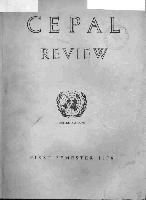 Styles of development in Latin America
by
Publication Date: June 1976In: CEPAL Review, No. 1, p. 97-128
Styles of development in Latin America
by
Publication Date: June 1976In: CEPAL Review, No. 1, p. 97-128 -
 Dos estudios sobre endeudamiento externo
by
Publication Date: 1977Serie:Cuadernos de la CEPAL, No.19
Dos estudios sobre endeudamiento externo
by
Publication Date: 1977Serie:Cuadernos de la CEPAL, No.19 -
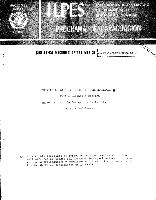 Teorías de la CEPAL sobre el subdesarrollo
by
Call Number: E/CEPAL/ILPES/VP/9 - E/CEPAL/ILPES/VP/9/ADD.1Publication Date: 1977
Teorías de la CEPAL sobre el subdesarrollo
by
Call Number: E/CEPAL/ILPES/VP/9 - E/CEPAL/ILPES/VP/9/ADD.1Publication Date: 1977 -
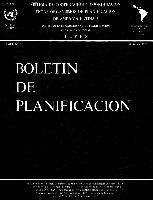 Boletín de Planificación, año 1, no. 1
Publication Date: noviembre de 1977
Boletín de Planificación, año 1, no. 1
Publication Date: noviembre de 1977 -
América Latina en el umbral de los años 80
Call Number: E/CEPAL/G.1106Publication Date: 1979Serie:Libros de la CEPAL No.2 -
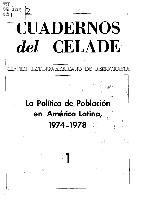 La política de población en América Latina, 1974-1978
Publication Date: febrero de 1979Serie:Cuadernos del CELADE No.1
La política de población en América Latina, 1974-1978
Publication Date: febrero de 1979Serie:Cuadernos del CELADE No.1 -
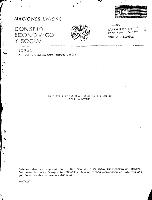 La pobreza estructural en el desarrollo de America Latina
by
Call Number: E/CEPAL/PROY.1/9Publication Date: 10 de agosto de 1979
La pobreza estructural en el desarrollo de America Latina
by
Call Number: E/CEPAL/PROY.1/9Publication Date: 10 de agosto de 1979 -
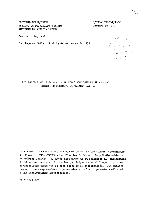 Estilos de desarrollo y el medio ambiente en el proceso histórico reciente de América Latina
by
Publication Date: octubre de 1979Proyecto CEPAL/PNUMA. Seminario Regional Santiago de Chile, 19 al 23 de noviembre de 1979
Estilos de desarrollo y el medio ambiente en el proceso histórico reciente de América Latina
by
Publication Date: octubre de 1979Proyecto CEPAL/PNUMA. Seminario Regional Santiago de Chile, 19 al 23 de noviembre de 1979
